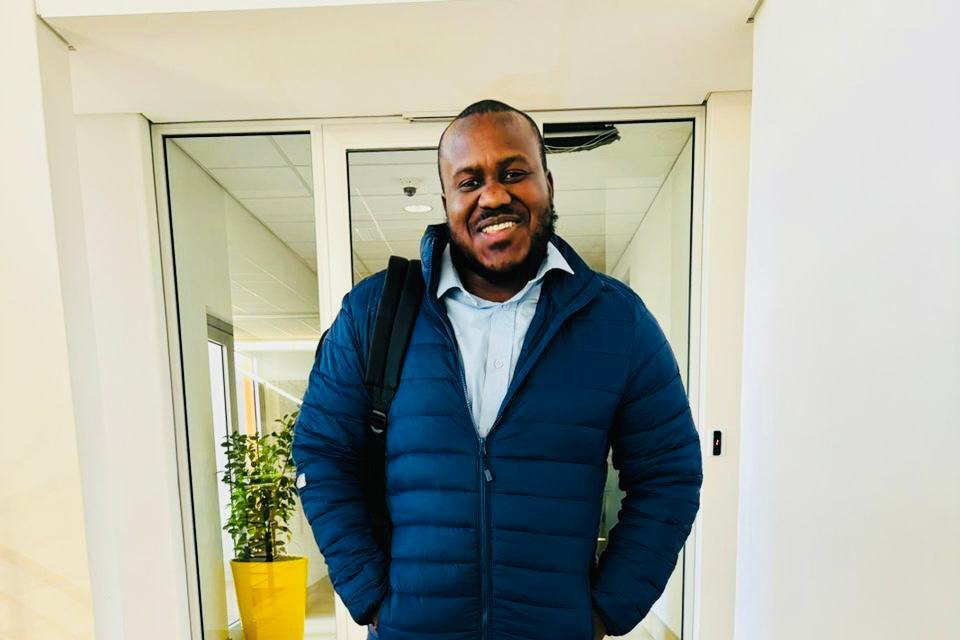
At NAMCOR, we are always proud to witness the incredible journeys of those who push boundaries, work tirelessly, and dare to make a meaningful difference. One such individual is Mr. Erich Nepembe, whose recent achievement of completing his PhD in pioneering research on offshore basins is a true testament to his dedication, resilience, and passion for his work.
For Mr. Nepembe, pursuing a PhD wasn’t about collecting a title or gaining recognition, it was about making a significant impact. As he puts it, “It wasn’t about achieving a degree for the sake of it; it was about contributing something valuable to my country.” His research focuses on paleovalleys in frontier offshore basins—systems that play a crucial role in hydrocarbon exploration. While paleovalleys on land are well-understood, their offshore counterparts are more challenging to predict. This is where Mr. Nepembe’s work comes in, specifically in the Namibe Basin, a largely unexplored region with huge potential. “The Namibe Basin holds immense hydrocarbon potential, but much of it remains underexplored. My research aims to bridge that knowledge gap,” he explains.
Through his research, Mr. Nepembe developed innovative methods to detect and map these offshore paleovalleys. He’s not just studying these systems for the sake of knowledge; he’s creating practical tools that can be used in similar offshore basins worldwide. “The challenge wasn’t just to study these systems; it was about creating repeatable methods that can be used in similar regions globally,” he shares. His work is not only helping Namibia tap into its own resources but also contributing valuable data to the broader scientific community.
This work aligns perfectly with NAMCOR’s goal of driving Namibia’s hydrocarbon exploration forward. “The ultimate goal of my research is to help advance Namibia’s hydrocarbon exploration ambitions,” says Mr. Nepembe. By leveraging his findings, NAMCOR strengthens its position as a leader in the energy sector while also contributing to local economic growth, job creation, and sustainable development. It’s research that’s not just about science, it’s about making a real difference for Namibia.
However, getting to this point wasn’t without its challenges. The road to completing his PhD had its fair share of obstacles, including delays caused by the COVID-19 pandemic, issues with data access, and the emotional toll of being far from home. “The emotional distance from my family and the stigma I sometimes faced abroad made it difficult, but I had to keep going,” he admits. It wasn’t always easy watching his peers move forward with their lives while he was buried in research. “But I pushed through,” he adds with a smile.
So, what kept him going through all of this? It wasn’t the pursuit of a degree or a prestigious title, it was his commitment to Namibia’s future. “Namibia needs more research-driven solutions to move forward,” he says, adding that his research was never just about the degree. It was about making a difference. Of course, there were personal motivations, too, like attending live football matches in the UK! “Small things like that kept me going,” he shares.
For professionals considering a similar path, Mr. Nepembe has some straightforward advice: “Make sure it’s something you genuinely want. If you’re passionate about solving real-world problems through research, go for it. Our country needs critical thinkers.” Research, according to Mr. Nepembe, is not a luxury, it’s a necessity for Namibia’s sustainable development.
Studying abroad not only expanded his professional skills but also gave him valuable insights into the socio-economic landscape back home. “Studying abroad made me see how much innovation is needed to address issues like governance and sustainable development back home,” he reflects. Today, he continues to be actively involved in regional research projects and energy conferences, contributing to NAMCOR’s growing body of knowledge. “I’m proud to be part of the team at NAMCOR, strengthening our expertise and contributing to Namibia’s energy future,” he says.
Balancing his personal life with the demands of his PhD was no small feat. “Being an introvert helped me cope with the physical distance from home, but the emotional distance, especially after becoming a father, was hard,” he admits. Missing key family milestones was tough, but it fueled his determination to finish his research for a better future for his family.
Mr. Nepembe leaves us with a powerful message: “Namibia still has untapped intellectual potential. If we’re serious about sustainable development, we need to leverage our human capital. Research is key to this.” His journey is a remarkable example of perseverance, passion, and purpose. His contributions to NAMCOR and Namibia will continue to inspire future generations and shape the country’s research and development landscape for years to come.

